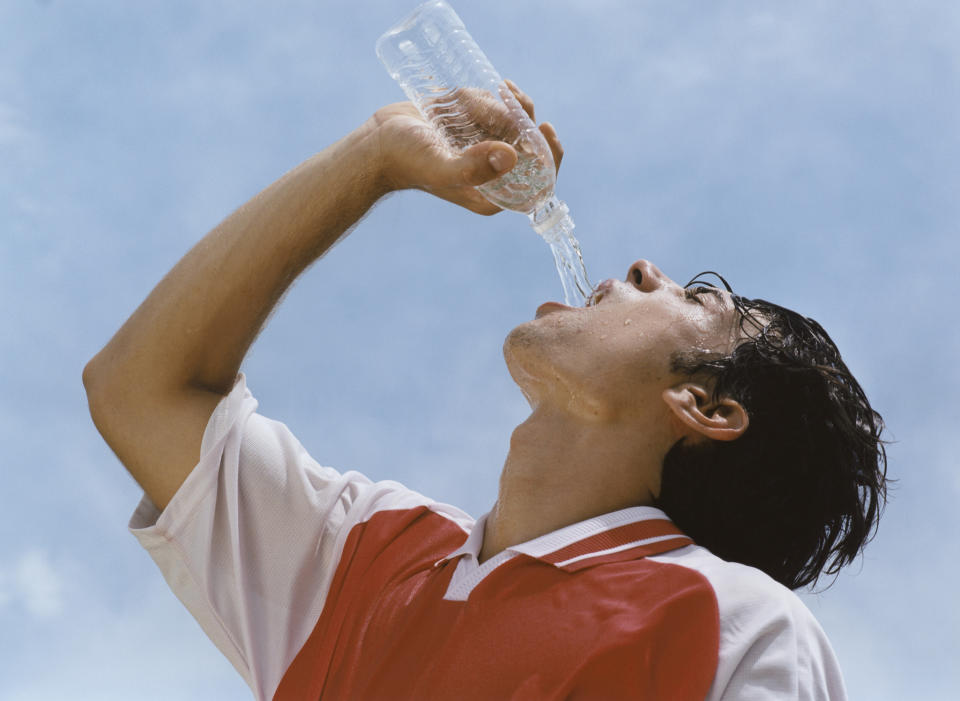"It's Like Our Mouth Becomes A Cup Of Acid": Here's What The Experts Have To Say About How Sparkling Water Affects Our Health

There's no denying that sparkling water is in vogue. One study predicts that the market for this bubbly beverage will reach a whopping $67.6 billion by 2030.
Personally, I'm a big fan of seltzer and soda water. I love the way the bubbles tickle my brain, and flavored options, especially my beloved Passionfruit LaCroix, helped me kick my old sugary soda habit.
But sometimes I wonder if sparkling water is really as healthy and hydrating as still water. To get to the bottom of things, I reached out to three experts who answered all of my questions about bubbly water.
When it comes to sparkling water and its effects on your body, there's good news and then there's bad news.
Is sparkling water as hydrating as regular water?
To start with the good news, I interviewed Ronald Maughan. Maughan is a professor at the St. Andrews University School of Medicine in Scotland and one of the authors of a 2016 study that compared the hydrating effects of various beverages.
According to Maughan, the carbonation in sparkling water has negligible effects on its hydrating powers as compared with flat water. "Most sparkling water is only lightly carbonated, and much of the CO2 disappears on pouring drinks and on letting them stand."

He also explained how the water we drink is processed inside our bodies. In fact, he says the contents of the gastrointestinal tract, which runs from the mouth to the anus, are technically considered to be outside the body until the small intestine absorbs them.
In some cases, he says, sparkling water might reach the small intestine a tiny bit faster than flat water. "Drinks that are highly carbonated may slightly increase the rate at which the drink is emptied from the stomach into the small intestine," Maughan says, "which is where most of the water absorption takes place."
The carbon dioxide in an extra-bubbly seltzer makes the stomach seem fuller, which causes it to empty into the small intestine just a little bit faster. "The effect is small, though." So if hydration is your goal, there's nothing wrong with sipping on a seltzer.

Some popular bubbly waters, like Topo Chico, for example, also contain minerals such as sodium and magnesium in small amounts. In larger amounts, as in sports drinks and rehydration beverages, these minerals boost hydration.
However, Maughan says, "The salt content of most commercial mineral waters is too small to have much of an effect." Still, if you're watching your sodium intake, you might want to peek at the nutrition facts.
Maughan also cleared up some common misconceptions about other beverages often said to be dehydrating. According to Maughan, the caffeine content found in coffee and tea is generally not enough to be dehydrating. "The exception might be very strong coffees that are drunk in small volumes." In addition, while strong alcoholic beverages should be avoided if you're concerned about dehydration, he says, "Low-strength beer or beer mixed with lemonade can be an effective rehydration drink."
And don't discount the water content of your food. Maughan says, "There is more water in a pound of tomatoes than there is in a pound of soda. If we choose our food carefully, we never need to drink any water at all."
Is sparkling water as healthy as regular water?
There's good news about sparkling water on the nutrition front as well. I reached out to Jen Baum, a registered dietitian nutritionist and one of the hosts of the podcast Nutrition for Mortals. Baum says sparkling water can be a great, healthy bev of choice for anyone who's not really a fan of flat water.
"Sparkling water can also just be a nice change from regular water too," Baum says. "Most of us enjoy variety, and I think that applies to the beverages we drink." She says she's also a fan of the bubbly stuff, adding, "Grapefruit Spindrift all the way!"
If you've ever accidentally had nothing to drink but soda water all day long, Baum says it won't affect your nutrition. "I’d rather have people hydrating themselves with beverages they enjoy than potentially not drinking enough during the day."

However, there are certain times when Baum would advise against consuming carbonated drinks. Some people may find that they trigger acid reflux, gassiness, and/or bloating. "If this is the case, for comfort, they may feel more comfortable limiting their intake," according to Baum. She also notes that carbonation can be irritating for folks who've recently had bariatric surgery.
In addition, people with diabetes may want to look carefully at the nutrition facts on flavored sparkling waters, especially those that contain juice, to ensure they're not consuming more sugar than expected. However, she notes, "Some sparkling waters may use artificial sweeteners for flavor, though many artificial sweeteners, like Truvia and stevia, are plant-derived."

If you've ever wondered what exactly is in the "natural flavors" you see listed on your LaCroix can, Baum explains that the FDA defines these as any flavorings derived from plant or animal sources.
"The tricky thing with the term 'natural flavors' is that regulations are pretty broad on what can be considered a 'natural flavor,'" says Baum. "And unlike food manufacturers, flavor manufacturers don't have to list their ingredients on a food label unless it contains one of the top allergens."
If you're curious about what's in the "natural flavors" of your brand of choice, you might be able to find out by sleuthing on their website. As for my fave, LaCroix, its flavors are derived from oils found in the fruits themselves.
Perhaps you've heard that sparkling water can weaken your bones, but that's a myth. A 2006 study found that soda can negatively affect bone density because of its phosphorus content. However, soda water and seltzer don't contain phosphorus, so an afternoon bubbly won't hurt your bone health.
Does sparkling water damage your teeth?
Unfortunately, when it comes to your luxury bones (aka teeth), dentist Dr. Cerisa Moncayo had to burst my bubble. When you drink sparkling water, a chemical reaction in your mouth turns carbon dioxide into carbonic acid. And acid erodes tooth enamel.
"Enamel is our tooth's outermost, protective structure," says Moncayo. "When tooth enamel is compromised, it leads to a host of dental issues, like tooth decay (cavities), weakened teeth, or sensitivity."

Though sparkling water is not as acidic as sugary sodas, it's still more acidic than plain old water, which can be bad news for our teeth. "Carbonic acid, or anything acidic, lowers the pH of our oral cavity. It's like our mouth becomes a cup of acid, slowly dissolving our enamel away at the microscopic level."
Moncayo also notes that the "natural flavors" Baum talked about can sometimes increase the acidity in sparkling water. "Flavors in seltzer water fall under a huge umbrella of 'other' ingredients which are not well regulated, and can (and do!) certainly contribute to an acid attack on our enamel."

If you're worried about your teeth, Moncayo says, limiting sparkling water and carbonation can be one place to start. But you don't have to kick your seltzer habit completely.
Moncayo suggests, "Swish flat water in between seltzers to neutralize the pH and protect from stains." You might also try drinking your seltzer through a straw so it doesn't come into contact with your teeth.
In addition, Moncayo says, "Read the label. Sugars, sugar alcohols, and flavoring can cause extra damage." Plain soda water and brands with fewer ingredients are likely going to be a little easier on your enamel.
Finally, she says, "Drink in one sitting, as opposed to sipping throughout the day." The more time it takes to consume a sparkling water, the longer your enamel is exposed to carbonic acid. So if you, like me, need some bubbles to make your brain work, it's best for your teeth to drink it down quickly.


